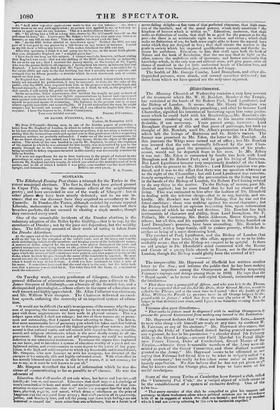The Morning Chronicle of Wednesday contains a very long account
of the treatment which Mr. W. H. Rowlett, Reader :it the Temple, has sustained at the hands of Sir Robert Peel, Lord Lyndhurst, and the Bishop of London. It seems that Mr. Henry Brougham was much struck with Mr. Rowlatt's preaching; and after he became Lord Chancellor, signified his intention of bestowing upon him some prefer- ment which he could hold with his Readership,—Mr. Rowlett's cir- cumstances rendering such an addition to his income exceedingly desirable, if not necessary. Years passed away, however : Lord Brougham disposed of this and that piece of patronage, but took no thought of Mr. Rowlett, until Dr. Allen's promotion to a Bishopric, which left the livings of Battersea and St. Bride's vacant. The former was promised to Mr. Eden, the latter to Mr. Rowlett. At this juncture the Whigs were turned out of office ; but Mr. Rowlett was assured that the rule universally followed by the new Chan- cellor, of making good the promised appointments of his prede- cessor, would not be departed from in his case. In Mr. Eden's it was not : Mr. Eden is connected by family ties both with Lord Brougham and Sir Robert Peel; and he got his living of Battersea. But Lord Lyndhurst became very suspiciously doubtful of the Chan- cellar's title to present to St. Bride's : Lord Eldon's opinion was pro- duced, and it was to the effect that there was no question whatever as to the right of the Chancellor ; but still Lord Lyndhurst was conscien- tiously scrupulous ; and finally the presentation to the living was put in the hands of the Bishop of London, Sir Robert Peel having refused to do any thing in the matter. To the Bishop, of course, poor Mr. ltowlatt applied ; but be soon found that he had no chance of the living. This was intimated to him after the fashion of Dr. Blonifield in dealing with the inferior clergy—that is to say, harshly, and un- kindly. Mr. Rowlett was told by the Bishop, that he was not the fittest candidate : there was nothing against his moral character ; but the Bishop had formed an opinion respecting him, upon information the sources of which he could not disclose. Mr. Rowlett has high testimonials Of character and ability, from Lord Brougham, Sir F. Pollock, Mr. Courtenay, Mr. Baron Alderson, Baron Gurney, and others; but all this, and his equitable claim to the living founded on Lord Brougham's promise, have been unavailing. Mr. Rowlett is condemned, with a large family, still to endure poverty, which he de- scribes as being of a most distressing kind. The conduct of Peel, Lyndhurst, and the Bishop of London (but especially of the two latter,) in this affair, appears to us to be inde- scribably mean: that of the Bishop we suspect to be spiteful. Is there no old grudge in Dr. Blomfield's mind connected with the Rector and Curate of a pretty little church in Essex, not in the diocese of London, though the Bi: hop would gladly have the control of it ?


























 Previous page
Previous page